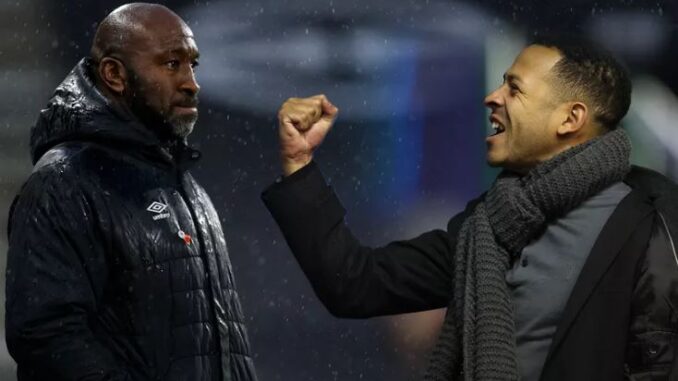
This time last year, ninth-placed Hull City were in almost exactly the same position as the Terriers now find themselves – or as close as you’re ever likely to get, at any rate
Just over a year ago, in early November 2022, Hull City were in a bit of a state. The optimism generated a takeover earlier in the year following difficult times had given way to a poor run of form.
Manager Shota Arveladze had been sacked in September, just eight months into the job. His departure failed to precipitate an upturn in form, despite some promising signs under caretaker manager Andy Dawson. Hull had the worst defensive record in the division, having suffered maulings both home and away from West Brom, QPR, Stoke, Swansea and Middlesbrough. Accordingly, they sat just one place outside the relegation zone, level on points with Coventry.
Now, with the cinders of Guy Fawkes effigies still lazily yet to be swept away, history is repeating itself – only it is doing so some 77 miles down the M62, at Huddersfield Town.
Huddersfield Town player looks ready to cast off tag that is both blessing and curse
Optimism generated by a takeover, yadda yadda, sacked in September, et cetera et cetera, terrible defensive record because of maulings, yes, all of it, even the bit about sitting in 21st, level on points with Coventry – albeit after 15 games, in Town’s case, rather than 18, and David Wagner has made Town look better once again by inspiring his Norwich side to an even worse defensive record.

Hull, meanwhile? They’re doing well, thanks for asking, sitting pretty in ninth place and hoping to make up the two-point gap to Preston North End and a place inside the play-off places. More power to them in that endeavour, as long as they don’t do it this weekend.
That turnaround from where they were this time last year is exactly what Huddersfield Town should aspire to do over the next 12 months: from worrying about relegation to having, for the time being at least, realistic hopes of pushing for a return to the Premier League.
Town are hoping they have already made the managerial appointment to make that happen. Darren Moore will necessarily need to do things his own way, of course, but at the weekend, he glommed onto the very approach that helped Liam Rosenior inspire his slow but steady revival of fortunes at the MKM Stadium.
Rosenior realised quickly that he had a limited but hard-working squad who needed things taking back to basics – and recognised that a disciplined point was infinitely preferable to a chaotic defeat. His record in his first half a dozen games at Hull bore close (but not identical) resemblance to Moore’s at Town: four draws, one defeat, and a home defeat, from a winning position, to a Reading side that had just started its doom spiral down the Championship table.
Fans were not happy, it’s safe to say, and nor was Rosenior. “I’m not going to have a go at the players because they’ve given me everything in the last week, but what we need to do is work on the small details,” he said after the game, which Reading had nicked in injury time after going behind in the ninth minute.
Nobody was to know it then, but Hull would lose just once more at home all season, and that was to runaway title winners Burnley. They have suffered just one more home Championship defeat in this campaign – and that was to one of the teams who replaced Vincent Kompany’s side, newly-relegated Southampton (a clash better known as the P&O Derby, probably).
Hull’s turnaround under Rosenior was not built on anything spectacular. Last season’s results following his arrival reads as a sea of yellow, if you’ll forgive that revolting image: Hull drew 14 of Rosenior’s 28 league games in charge last season. But they also lost just six, fewer than anybody bar Burnley and Luton. Only the third promoted club, Sheffield United, joined Burnley and Luton in conceding fewer goals than Hull.
The key to Hull City’s successful turnaround was a commitment to a back-to-basics, disciplined, and safety-first approach under Liam Rosenior. Despite not aligning with Rosenior’s overall football principles, this approach allowed Hull to secure a slow and steady climb to 15th place, avoiding the perils of relegation. While not glamorous, this strategy proved infinitely preferable to the alternative.
Crucially, adopting this approach early on meant that Hull could plan ahead for the summer transfer window well in advance. The transformation of their attack, featuring players like Jaden Philogene from Aston Villa, Aaron Connolly from Brighton, and Premier League loanees Liam Delap and Scott Twine, showcased the positive impact of strategic planning.
Huddersfield Town may need to expedite their business, especially in the upcoming January transfer window, to make up for lost time. However, the model set by Hull provides a blueprint for Town and manager Darren Moore to follow. By steering clear of the emergency situation of falling into the bottom three, they can sensibly and realistically aim for a turnaround akin to Hull’s success within a year. The lesson learned is that building a team doesn’t need to happen overnight, but rather through careful and achievable steps.
Leave a Reply